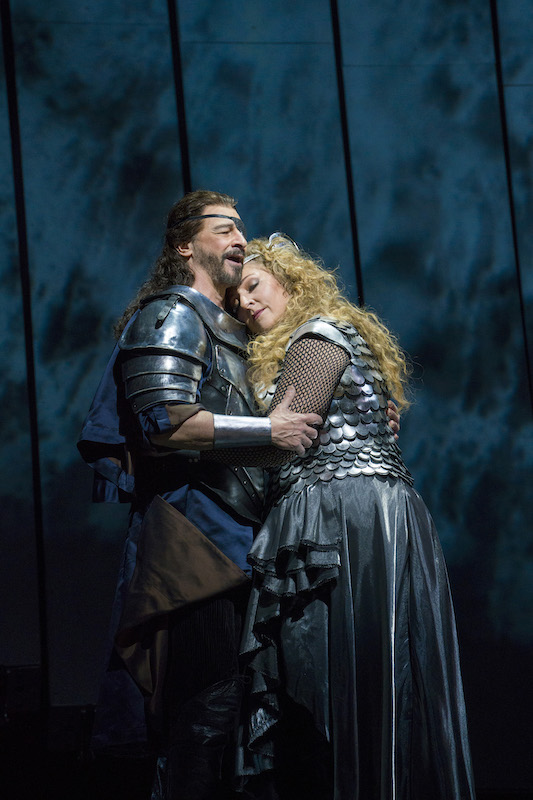Goerke brings vocal power, dramatic impact to Met’s “Walküre”

Greer Grimsley and Christine Goerke in Wagner’s “Die Walküre” at the Metropolitan Opera. Photo: Richard Termine
Say what you like about the Metropolitan Opera’s production of Wagner’s Die Walküre by Robert Lepage, with its Valkyries riding oversize Popsicle sticks, it is now well-equipped in the vocal and conducting departments. Soprano Christine Goerke’s long-anticipated debut as Brünnhilde Monday night proved worth waiting for, the rest of the cast gave uniformly high-quality performances, and conductor Philippe Jordan kept it moving, in both senses of the word.
Goerke’s performance was notable more for powerful, expressive singing and character development than for vocal gymnastics, but then Brünnhilde’s war whoops occupy just a few seconds of Wagner’s score, followed by hours of interacting with the other characters in the opera.
Her voice has a fine, gleaming timbre with plenty of depth, although her youthful character didn’t often evoke the darker colors Goerke is known for in other roles. For sustaining a vocal line and a dramatic moment, this singer has few peers.
Physically, a mere suggestion of flouncy teenage mannerisms was enough to establish Brünnhilde’s headstrong youth; Goerke did not need the Mary Pickford curls the wig department fitted her with. Apparently someone thought the natural, windblown Brünnhilde of Met posters and the program cover looked too mature. It would have been better to leave that up to Goerke’s considerable acting skills.
In contrast, Greer Grimsley’s loose-limbed Wotan was, physically at least, a little too much suburban dad and not enough god. In unguarded moments, he could be seen slumping a little and flicking his spear around casually. And someone might have suggested he stand still while pronouncing his fateful sentence on Brünnhilde in Act III, instead of pacing around and waving his arms as if telling her she was grounded for a week. But one senses in this production an urge to make these mythical characters “relatable,” so maybe that was part of it.
Vocally, however, Grimsley’s steely bass-baritone rang with authority and purposeful diction, and bore up well through a punishingly long series of expository monologues. (You wouldn’t think a god would have to explain himself so much.) Yet he still had the strength to be tender in his parting with Brünnhilde at opera’s end.
The opera was fast out of the gate vocally as well, with the three principals in Act I all giving strong performances. Stuart Skelton brought a bold, full tenor to Siegmund, giving a powerful account of his own violent and tragic backstory (redundantly and distractingly re-enacted by a shadow pantomime as he told it), and wordlessly falling in love with the hospitable Sieglinde.
In the latter role, soprano Eva-Maria Westbroek had to contend at first with her character’s downtrodden state (and drab attire and makeup to match), but blazingly discovered passion with Siegmund by the act’s curtain, and gave anguish full voice during the tragic action that followed. And her triumphant high A’s in Act III, delivered face front, downstage, were the very definition of “Wagnerian.”
Bass Günther Groissböck’s hard, penetrating bass made for a menacing Hunding indeed, but the singer also conveyed the deep hurt that drove his lust for revenge.
Mezzo-soprano Jamie Barton as Wotan’s wife Fricka bent the ambivalent god to her will, and did it all with sheer strength of voice and personality. Her static blocking, almost motionless on a high point of the set, was apparently meant to symbolize her character’s uncompromising moral attitude, but it was also a welcome relief from the pointless crisscrossing that the performers were directed to do elsewhere.
Goerke’s Brünnhilde was hailed, debated, and protected by a big-voiced, well-matched gaggle of Valkyrie sisters, sung by Kelly Cae Hogan, Jessica Faselt, Renée Tatum, Wendy Bryn Harmer, Eve Gigliotti, Maya Lahyani, Mary Phillips, and Daryl Freedman.
Conducting from memory, Jordan appeared deeply engaged in every moment of Wagner’s score, drawing committed playing in the tender passages, the talky ones, and the flashes of sudden drama. The occasional cracked horn entrance was more than made up for by superb solos and small ensembles: cellos as Siegmund and Sieglinde fall in love, and (hours later) oboe and bassoon for a father-daughter farewell.
Die Walküre runs through May 7. Siegfried opens April 13. metopera.org; 212-362-2000.






